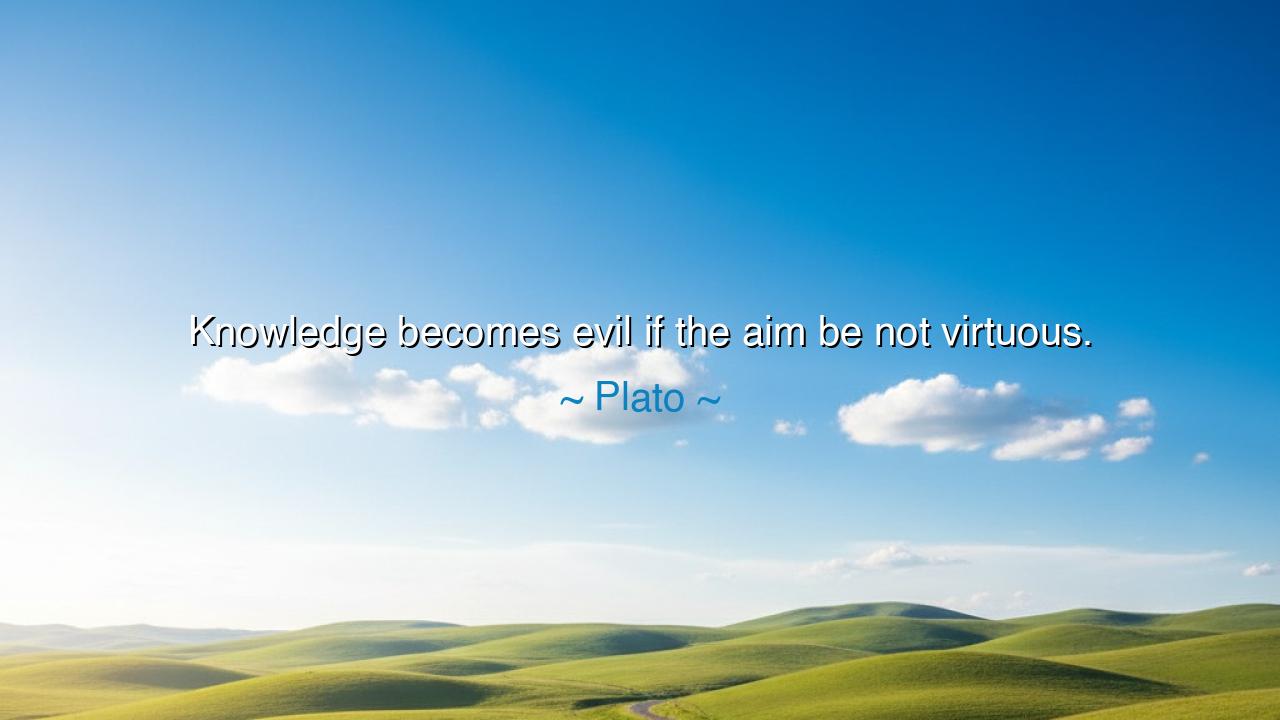
Knowledge becomes evil if the aim be not virtuous.






The words of the philosopher Plato echo through the ages with a gravity that cannot be ignored: “Knowledge becomes evil if the aim be not virtuous.” In this saying, he warns us that knowledge, though powerful and radiant, is not inherently good. It is like fire—able to warm, to build, and to illuminate, yet equally able to destroy, to consume, and to devastate. The worth of knowledge lies not in its possession, but in its purpose. If it is directed toward virtue, it uplifts humanity; if it is bent toward greed, cruelty, or domination, it becomes a weapon more dangerous than ignorance itself.
Plato, who sat at the feet of Socrates and whose thoughts gave birth to centuries of philosophy, understood that the soul of a man must be guided by virtue if his wisdom is to serve justice. For knowledge without virtue is cunning, and cunning without restraint corrupts both the wielder and the world. He observed in Athens how orators, skilled in speech, used their knowledge of persuasion not to reveal truth but to manipulate the crowd, leading to the condemnation of Socrates himself. Thus, the power of knowledge, when divorced from virtue, became an instrument of injustice.
History itself bears countless witnesses to this truth. Consider the story of the Manhattan Project, where the brilliance of science unlocked the secrets of the atom. Knowledge had advanced to its pinnacle, but without the full restraint of virtue, it gave birth to weapons of unimaginable destruction. Hiroshima and Nagasaki became testaments to the dual nature of knowledge—triumph of intellect, tragedy of morality. The scientists possessed wisdom of matter, but humanity was left to wrestle with the question: was the aim virtuous, or had knowledge indeed become evil?
Yet we also see the opposite—when knowledge is wed to virtue, it becomes a blessing to the world. Think of Louis Pasteur, whose studies in microbiology led to vaccines that saved millions of lives. His knowledge, guided by the aim of compassion, was a light in the midst of suffering. Or recall Florence Nightingale, who applied statistics and medical science to heal wounded soldiers and reform hospitals. Here, knowledge did not become evil, for its aim was virtuous; it was directed toward the flourishing of human life.
Plato’s wisdom is thus not a condemnation of knowledge, but a call to responsibility. To seek knowledge without asking, “For what purpose?” is to play with fire in a dry forest. The mind must be disciplined by the soul, and the soul must be guided by virtue. Otherwise, what is meant to liberate may enslave, and what is meant to heal may wound. Knowledge is power, but only virtue determines whether that power will bless or curse.
The lesson for us is urgent and clear: seek knowledge, but marry it always to virtue. Do not learn merely for pride, or for domination over others, but for service, compassion, and truth. Let every discovery be tested not only in the light of reason, but in the fire of conscience. Before wielding knowledge, ask: Does this aim bring justice? Does it bring life? Does it bring dignity to others? If the answer is no, then the pursuit of knowledge is hollow, and its fruits may turn bitter.
Therefore, O listener, carry Plato’s warning as a shield upon your heart: knowledge becomes evil if the aim be not virtuous. Strive to be both wise and good, both learned and just. For the world is filled with clever men who led nations to ruin, and yet it remembers with reverence those whose wisdom was tempered with compassion. Be among the latter. Use knowledge as a tool for light, not shadow; for healing, not harm. In this way, your learning will not corrupt, but will elevate, and through it you will serve not only yourself, but all of humankind.






AAdministratorAdministrator
Welcome, honored guests. Please leave a comment, we will respond soon